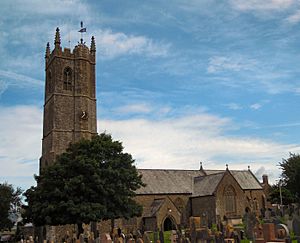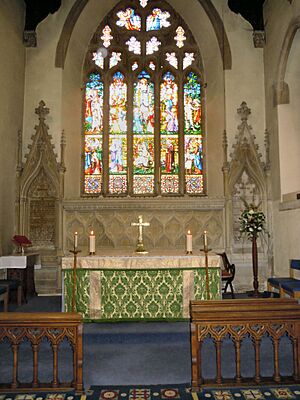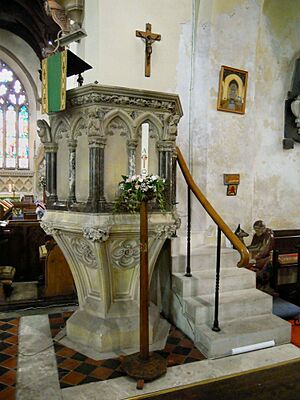Church of St Margaret of Antioch, Northam facts for kids
The Church of St Margaret of Antioch is a special church in Northam, a town near Bideford in Devon, England. It's an Anglican church, which means it belongs to the Church of England. This church is dedicated to Saint Margaret. It's also a Grade I listed building since 1951, meaning it's a very important historical building. It is part of the Diocese of Exeter.
Exploring the Church's History and Design
A very old Norman church once stood here. The church you see today was mostly built in the 1400s. However, the lower part of its tall tower is even older.
How the Church Was Restored
Between 1845 and 1870, the church was carefully repaired and updated. People donated money, and a Reverend named I.H. Gosset also helped pay for it. An architect named Daniel Mackintosh from Exeter guided the work. He used a style called early Perpendicular, which was popular in the 1400s.
The Tower and Its View
The church stands in a great spot, looking out over the sea. You can even see Lundy Island far away. The tower is 170 feet tall and holds eight bells. It was built in the early 1400s. For hundreds of years, sailors used its prominent position to guide their ships in the Bristol Channel. The side of the tower facing the sea was even painted white to make it easier to spot!
The main part of the church, called the nave, dates back to the 1200s or 1300s. As more people moved to Northam during the Elizabethan era (when Queen Elizabeth I was in charge), the church needed more space. So, a new section called a north aisle was added. An old inscription on one of the arches says, "This yele was made Anno 1593," with 'yele' meaning 'aisle'.
The Beautiful Ceiling and Chapel
The ceiling, built during the Elizabethan era, is very special. It's a "barrel vault" ceiling, shaped like the inside of a barrel. It's thought that local shipbuilders created it. They carved symbols like the Tudor rose, plants, the Saint George's Cross, and symbols of the Passion of Jesus into the wooden bosses (decorative knobs).
There's also a part of the church called the Chapel of Saint George. People believe it was once used by a group called the Guild of Saints John and George. This group helped poor people during the Middle Ages.

The Ancient Font and Statues
The baptismal font is where babies are baptized. This font was found buried under the tower floor during the Victorian era. It's interesting because it has a crack and marks where locks used to be. These locks stopped people from stealing the holy water. The font was repaired in 1848. Reverend Isaac Henry Gosset wrote that local stories said the font was broken during the English Civil War by soldiers.
Next to the font, you can see a colorful statue of Francis of Assisi with the Wolf of Gubbio. This is a copy of a 1927 artwork by Mother Maribel, an Anglican nun and artist.
The Northam Kyrie and Other Features
Also near the font is a copy of the 14th-century Northam Kyrie. This is a page from a medieval hymn book that was used in the church long ago. The music is in a style called plainsong, and the words ask, 'Lord have mercy upon us.' The Northam Kyrie was found in 1933 inside an old churchwarden's book from the Elizabethan era. The original is kept safe at the Devon Heritage Centre in Exeter.
The pulpit, where sermons are given, is made of Devon marble. It replaced an older Georgian-style pulpit. The Lady Chapel was built in 1623 and holds the church organ, which was built in 1866 by J. W. Walker & Sons Ltd. The altar in this chapel is a memorial to those who died in World War I. A newer statue in the chapel shows the Suffering Madonna and Christ Child, carved by Eric Collingwood, who was a member of the church.
Exploring the Churchyard

The churchyard, where people are buried, has two parts. The older part is right around the church and has many old graves. The newer part is reached through a gate at the top of the old churchyard.
Notable Graves in the Old Section
In the old section, there's a grave believed to belong to Salvation Yeo. This is a character from Charles Kingsley's famous novel Westward Ho!. Another grave belongs to Benjamin Rogers, a soldier from the Napoleonic Wars. He fought against Napoleon in many battles and even guarded him as a prisoner on Saint Helena. Benjamin later returned to Northam and lived to be 90 years old. You'll also find graves of sailors and a building called the Mortuary Chapel, which is now used as a meeting room for the church.
The musician and conductor Clarence Raybould is also buried in the older churchyard.
Graves in the New Section
In the newer churchyard, several Anglican nuns are buried in shared plots. There are also graves looked after by the Commonwealth War Graves Commission. This includes one for an unknown merchant seaman whose body washed ashore during World War II. His grave simply says, "Known unto God."
 | Jessica Watkins |
 | Robert Henry Lawrence Jr. |
 | Mae Jemison |
 | Sian Proctor |
 | Guion Bluford |




